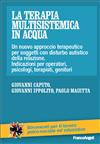
Un nuovo approccio terapeutico per soggetti con disturbo autistico della relazione. Indicazioni per operatori, psicologi, terapisti, genitori
Una guida pratica che intende fornire delle risposte alle esigenze dei genitori, degli operatori (educatori, terapisti, psicologi) e di quanti interagiscono con bambini e ragazzi con disturbo autistico e disturbi della relazione. Il testo illustra la Terapia Multisistemica in Acqua (TMA), un approccio che facilita la gestione delle emozioni e l’integrazione sociale, favorendo la rieducazione e la modificazione degli schemi cognitivi, comportamentali, comunicativi, emotivi e senso-motori.
cod. 1305.99
